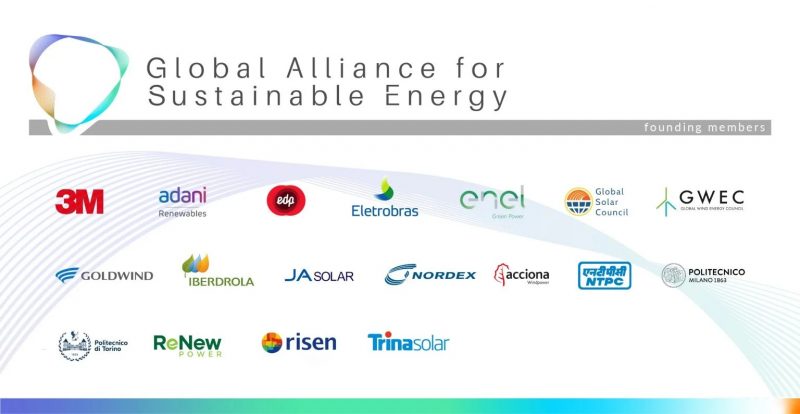PVTIME – 17 founding members including utilities and global players in the solar PV and wind value chains, sector associations and innovation partners from across the renewable energy value chain and the sector’s innovation ecosystem launched a new organization to ensure renewables are wholly sustainable for people and the planet and lead a just transition away from fossil fuels.

The Global Alliance for Sustainable Energy brings together utility companies from diverse geographies, major manufacturers in the wind power and solar PV supply chains as well as sector associations and innovation partners. The 17 founding members are, in alphabetical order: 3M, Adani Green Energy Ltd., EDP, Eletrobras, Enel Green Power, Global Solar Council, Global Wind Energy Council, Goldwind, Iberdrola, JA Solar, Nordex Group, NTPC Limited, Politecnico di Milano, Politecnico di Torino, ReNew Power, Risen Energy and Trina Solar.
The Global Alliance for Sustainable Energy aims to redefine the meaning of ‘sustainable energy’ and embrace all those working in and impacted by renewables, joining efforts with civil society, end-users, policymakers, academic institutions, materials suppliers, Original Equipment Manufacturers and likeminded utilities to interface with governments and investors. The initiative is fully aligned with the 2030 agenda set out in the UN Sustainable Development Goals (SDGs).
While wind and solar have distinct characteristics as renewable technologies, they are highly complementary and share both similar growth trajectories and similar challenges to their sustainable deployment. Closer alignment between wind and solar is therefore critical for accelerating the energy transition.
The launch of the Alliance comes at a critical time for climate action and the energy transition, just two months ahead of the United Nations’ COP26 climate summit due to take place in Glasgow. Meanwhile, the latest scientific assessment from the UN’s Intergovernmental Panel on Climate Change (IPCC) has warned that the world is off track to limit global temperatures increase to 1.5°C above pre-industrial levels or even keep them well below 2°C, as set out in the 2015 Paris Agreement, and has indicated that the planet will warm by 1.5°C in the next two decades without drastic moves to eliminate greenhouse gas emissions. UN Secretary General Antonio Guterres said this scientific consensus “must sound a death knell for coal and fossil fuels before they destroy our planet”.
The pathway to keeping global heating within the limits set by the Paris Agreement is net-zero by 2050 and climate action needs to be stepped up to reach that goal. In that scenario, almost 70% of electricity generation globally would come from solar PV and wind power, according to the International Energy Agency (IEA). Renewable power technologies, led by wind and solar PV, have already stepped up to dominate new installations of electricity generation, as they have become the cheapest sources of power in many markets. In the past seven years, according to the International Renewable Energy Agency (IRENA), more renewable power was added annually to the world’s grids than from fossil fuels and nuclear combined: in 2020, the dominance of clean technologies over traditional sources climbed further with 260 gigawatts of renewables-based generation added worldwide, more than four times that of other sources.
The 17 members of the Alliance are set to work together to tackle the sustainability challenges in this transition and bring results both in the short and the medium term. They start their collaboration by focusing on four key areas where they can achieve quick wins for the sustainability of the renewable energy industry, aligning different players by setting and harmonizing standards and metrics, around which common targets can be set, and aligning around best practices. The focus areas are: net-zero emissions and CO2 footprints; circular economy and design; human rights; and the water footprints.
The alliance is open to new members who share this vision and can contribute concretely towards the ultimate goal of becoming a truly sustainable industry within the transition to net-zero by 2050.











